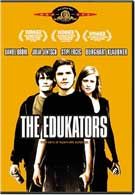A wealthy Berlin family comes home to find their furniture stacked in the middle of the living room, the stereo in the fridge, and Mom's precious porcelain figurines in the toilet. On a piece of paper taped to the wall are the words, "The fat years are past", signed "The Edukators". What's going on here? What fat years? Has there been a break-in by performance artists from Weight Watchers? The Edukators is the latest film from Austrian director Hans Weingartner, who cowrote and coproduced. The film was Germany's first entry at Cannes in over a decade, was nominated for a Gold Palm award, and received a ten minute standing ovation at the Festival.
Berliners Jan (Daniel Bruhl of Goodbye Lenin) and Peter (Croatian-born Stipe Erceg) have been friends for fifteen years. Now in their twenties, they spend their nights cruising the city in a van packed with surveillance gear. Their brand of political action is to scope out the residences of the rich and break into them. They are the “Edukators”, and they aim to make their victims very, very uncomfortable: not by stealing from them, but by scaring them out of their fat-cat complacency. Harmless fun? Wait and see.
Jan is the serious one. He listens to Punk and Techno, spouts revolutionary slogans, and huffs oxygen from a device that extracts it from the air, presumably to stimulate his brain. Peter is far less intense, with a goofy grin and happy-go-lucky attitude. He’s in heaven cruising down the autobahn, listening to “Memories are Made of This” on the stereo, the kind of guy who’ll pause the revolution to have some ice cream.
Jule (Julia Jentsch), a waitress and equal pay for equal work activist, is Peter’s girlfriend. Sweet and good-natured on the surface, she handles snotty diners politely, but she’s got enough rage inside to key a Mercedes in the restaurant parking lot. Jule wants to break out of her life and do something more meaningful, but, due to an accident with her uninsured car, she owes 100,000 Euros to Hardenberg (Burghart Klaussner), a wealthy businessman whose Mercedes (what else?) she smashed. She’s been evicted from her apartment and moves in with Peter and Jan, who’s pissed off by the intrusion and needs oxygen pronto.
Peter has wangled a weekend in Barcelona, but Jule, overwhelmed by her problems, opts out of going. With Peter gone, she and Jan discover common ground, and are soon involved in risky stuff. Their target of opportunity: Hardenberg, the man to whom Jule owes the money. They break into his house. Jule gets bloodlust and revels in the adrenaline high of trashing the home of her nemesis. In the midst of a swimming pool scene, the water awash with furniture and hormones, Jan and Jule begin a sexual connection.
Things soon start to go seriously wrong. Hardenberg, who has a smug, supercilious look reminiscent of Newman on “Seinfeld”, returns home unexpectedly. Soon, Jan and Jule, joined by Peter, have an unwanted pet capitalist pig on their hands. They’re too nice and principled to kill him, so they kidnap him and drive him off to a cabin in the Austrian Alps.
The rest of the story, with the stakes now significantly raised, takes on a much more serious tone. As we learn more about Hardenberg, a connection is made to the 1968 student-led revolt in Germany, a time when kidnapping and murder were tools of the revolutionary trade. But what we have here is three lightweights finding themselves in a heavyweight bout.
Director Weingartner sees young Germans today as far removed in time and spirit from 1968 and disquieted by today’s economic stagnation. Born two years after the student revolt, and a self-described Punk when Punk was passé, he acknowledges that The Edukators strongly reflects his own belief that questioning the status quo, and taking action, are essential to human fulfillment and progress.
The film succeeds in spite of being somewhat overlong. The three main characters are appealing and well-realized, though Hardenberg comes off as less credible. The intelligently-written screenplay manages to balance serious themes with lighthearted, tongue-in-cheek touches. At one point, Jan says to Jule, "Smoking dope chokes revolutionary energy." He can barely keep a straight face. The hand-held camera work lends authenticity and immediacy to the action sequences, and the music, which includes Jeff Buckley's version of Leonard Cohen's "Hallelujah", is terrific.
The Edukators has a positive, life-affirming message, as well as a warning to the naive: "People don't change". After seeing the film, I definitely felt more "edukated". The DVD is a 1.85.1 anamorphic widescreen transfer. Colors are very well-defined, with realistic flesh tones. The sound, Dolby 5.1 surround, is of good quality, with dialog clearly reproduced. There are optional subtitles, and closed captioning is available in English only. English subtitles are clear and readable.
There are no extras other than the trailer and previews of contemporaneously-released films on DVD. This is unfortunate, since I certainly would have liked to hear more from the director, co-writer and stars concerning this thought-provoking film. In sum, The Edukators is a well put-together disc and a worthwhile rental.

Dexter: Original Sin Made Me Holler At My TV When That Killer Easter Egg Appeared, And The Creator Shared His Own Excitement

Landman's Finale Finally Introduced The Character I've Been Waiting For, But Totally Dropped The Ball With Another Underused Actor

Severance Stars Have Heard Fans' Wild Theories, And I'm Fascinated By Two That Weren't Immediately Debunked
Most Popular




